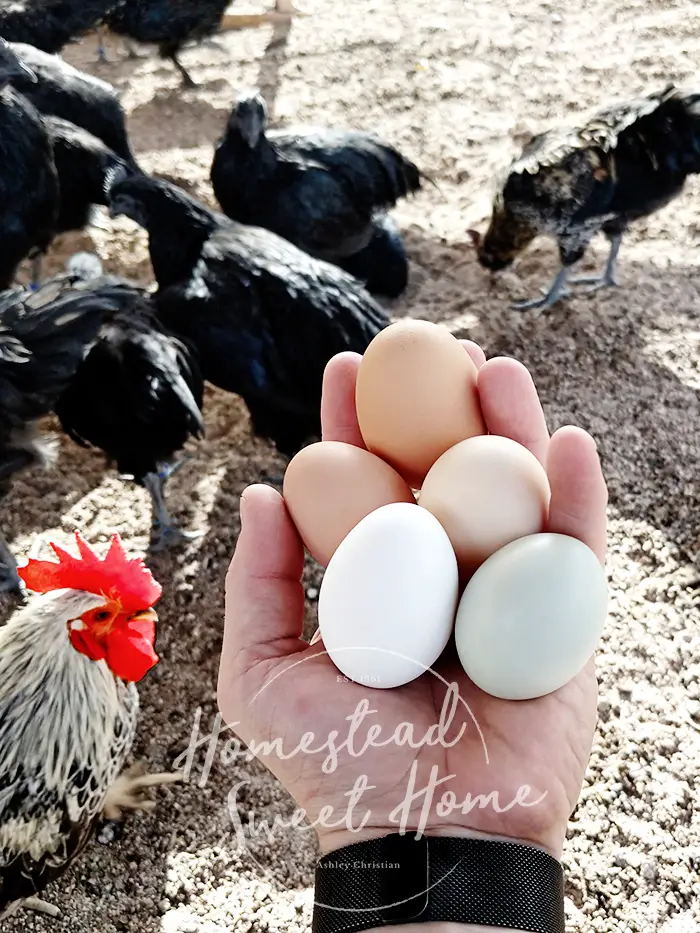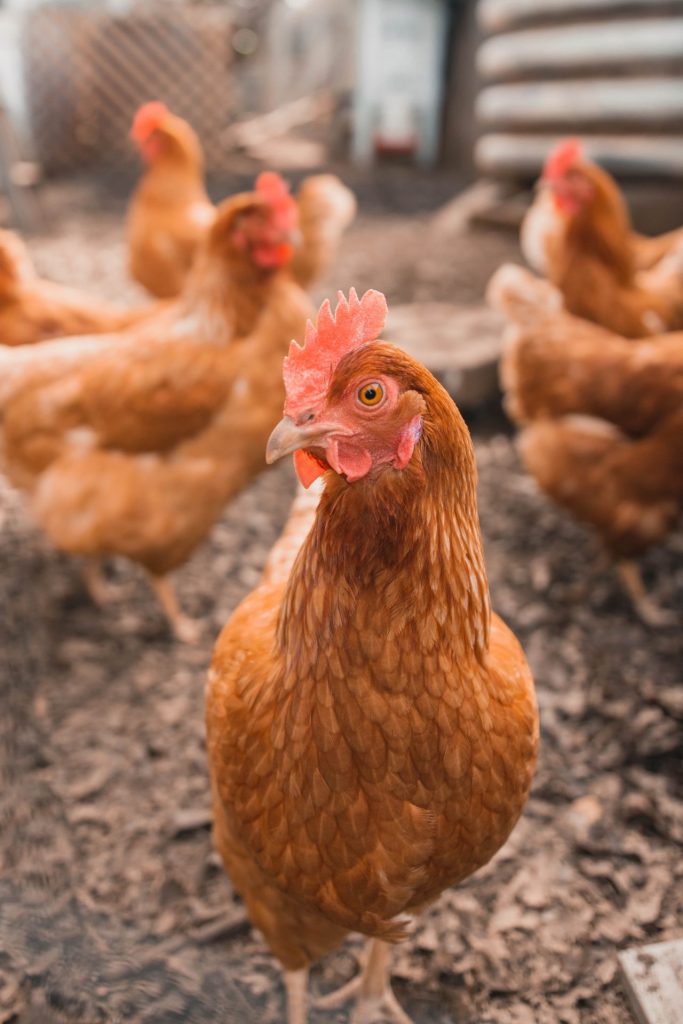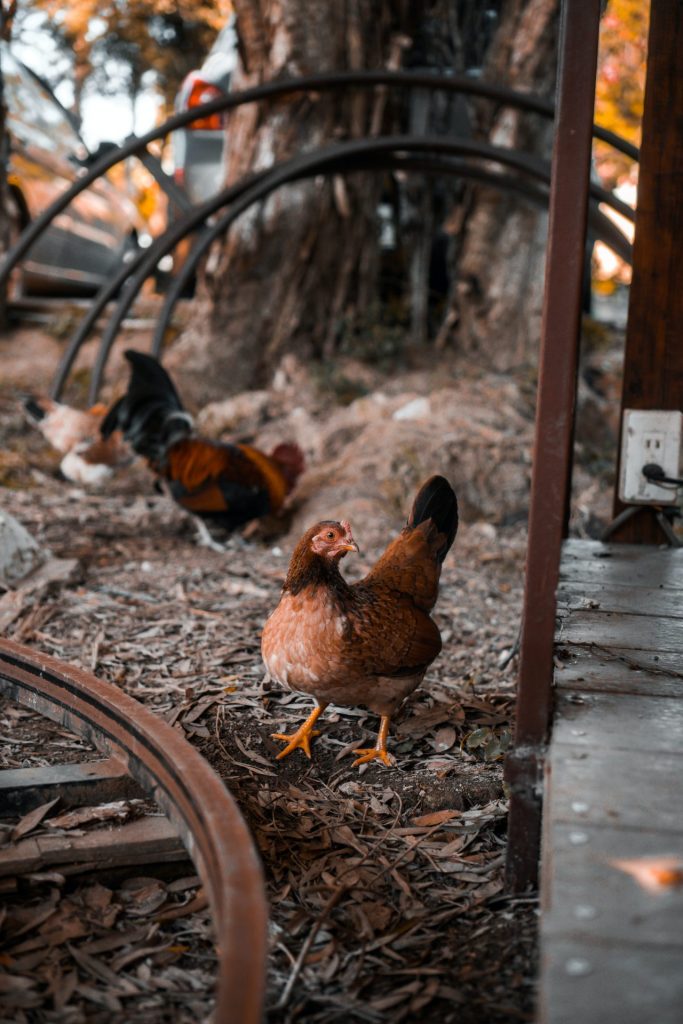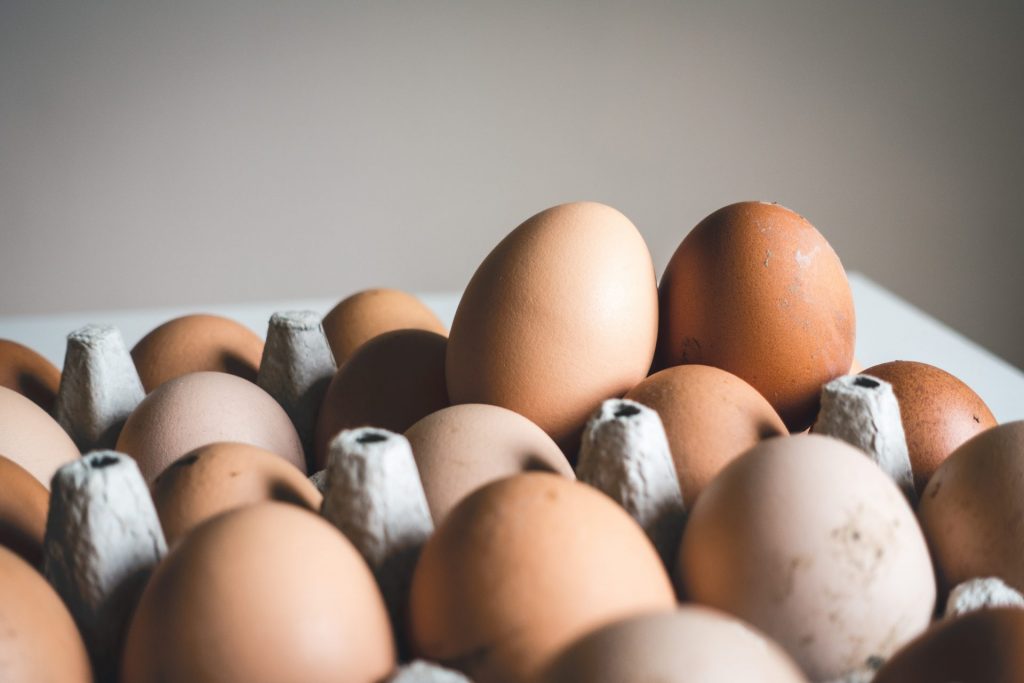When Do Chickens Start Laying Eggs? 6 Signs + Tips to Encourage Laying

Chickens start to lay eggs around 18 to 20 weeks, or around 5 to 6 months old, depending on the breed and if they have ideal laying conditions. You will have some extreme overachievers that begin laying at 16 weeks, and some later bloomers that can take up to 8 to 9 months to start laying. A chicken’s breed is the biggest factor in when they start laying eggs, but there are some signs you can watch for and steps you can take to encourage them to begin laying sooner rather than later.
Important Tip: A rooster is not necessary for your hens to begin laying eggs, they will simply lay unfertilized eggs!
How do You Know When Chickens are Ready to Lay Eggs? (6 signs to watch for)
When pullets, or young hens, are nearing the time they will start laying, you may wonder when do chickens start laying eggs, and how can you tell? The easiest way to tell is to observe behavior and appearance changes.
- The easiest sign to observe that your chickens are ready to lay eggs is the appearance of their combs and wattles. Prior to beginning laying eggs, their hormones will signal growth and swelling of their combs and wattles, as well as a change from a pink color to a deeper red.
- If you have a rooster, you will notice your hen starting to hang around the rooster more. She will instinctively know she is getting ready to breed. You may even see them begin to crouch for breeding around the rooster. This is a sure sign they are very close to beginning to lay eggs. If you don’t have a rooster, you may notice your hens do this submissive squat to their humans when you try and pet them. We find this sign is usually followed by laying in a week or two.
- If your chickens are ready to start laying eggs, you may notice them investigating the nesting boxes. They are searching for a safe, soft place to lay their eggs, even before the process begins. You could even add one dummy egg or golfball in their nesting boxes to signal “hey, this is a good place to lay!”
- Chickens have a loud “egg song” they sing when laying eggs. This usually happens in the morning and is a good signal to go check your nesting boxes. But, before they begin laying, your hens may start testing out their voice and practicing their egg song. This is a sign their time to lay is coming soon.
- When your hens get close to laying, you may notice their appetites increase. They are seeking out the nutrients their bodies need to produce eggs and support their hormones. You can start to transition your hens to laying feed when you notice this happen, or around 18 weeks. In some cases of faster-growing breeds, you can begin this feed transition as early as 16 weeks.
- Before your hens really begin to produce regularly, you may find they lay a few “blank” eggs with no yoke and softshells that are small in size. They can do this for around a week before you start seeing nice-sized eggs with yokes being laid.

Nesting Box Tips to Get Your Chickens to Start Laying Eggs
If you are a new chicken owner, I’m sure you’re excited to start getting eggs from your chickens. You may be wondering “when do chickens start laying eggs!?” and if there is anything you can do to help the process along, or if you just have to wait. The answer is a little of both.
To encourage the earliest possible laying for your hens, you can provide them with nesting boxes filled with soft hay or pine shavings starting at about 16 weeks. The presence of a safe, comfortable nesting place to lay eggs in, will signal to your chicken she’s free to begin laying whenever she’s ready.
As a general rule, you should have one nesting box for every 3 hens. 12×12 is a good size that will give your hens plenty of space without crushing their eggs or even allowing multiple chickens to lay at the same time, which they often do. Chickens will like their nesting boxes up high but don’t put them higher than your perches, or under your perches, or you will end up with unsanitary poop all over your nesting boxes and on your eggs.
If you have a large breed that cannot fly like a Jersey Giant or Brahma chicken, you’ll need to provide them with slightly larger nesting boxes in a 14×14 size and keep them low to the ground so they are easy to access.
Your ladies will also love privacy while they lay. A dark corner of the coop works well. Some chicken owners have even placed split curtains over their nesting boxes that their hens can easily get in and out of to provide extra privacy. The girls love it.
Often the first nesting box a hen lays in is the one she’ll prefer to keep using. Sometimes all your chickens will think this is a good idea and use the same nesting box. This isn’t a problem as long as your chickens don’t seem bothered and aren’t breaking eggs. But if you do notice these problems, simply close off the preferred nesting box. Once your chickens have realized they like the other nesting boxes, you can open up the preferred one again.
Use Light to Get Your Chickens to Start Laying Eggs
Even though age is the most important consideration to answer the question “when do chickens start laying eggs?” their exposure to light can also be an important factor. Daylight triggers the egg-laying instincts in chickens. Laying hens will need a minimum of 16 hours of daylight to lay. This is part of the reason many breeds of chicken will stop laying in the wintertime.
To help expose your hens to more light, it’s important to include a light source in their coop. Windows in the coop letting in natural daylight are the best source you can find. Explore our Beautiful Chicken Coop Plans for coops that meet all the right specifications to help your chickens start laying eggs, including windows. Make sure you cover the windows with ¼ hardware cloth as basic screens won’t protect them from predators.
If you live in a climate with very short days in the winter, you can also add a light on a timer. Keep the light on for 16 hours during the day, and off for the remaining hours of the night. This can help trigger some chickens to begin laying, or to lay through the winter.
Feed Your Chickens the Correct Feed to Get Them to Start Laying Eggs
When do chickens start laying eggs? Well, some of that depends on what feed they are given. If they don’t have the right nutrition from hatching to laying, they may begin laying later, or not lay at all if they don’t have the necessary building blocks.
When chicks are first hatched, they will need a higher protein chick starter as they grow. But once they near sexual maturity, at around 18 to 20 weeks, you’ll want to switch their feed to layer feed that is lower in protein, about 16%, and includes supplemental calcium. Calcium is important for your chicken’s eggshell strength and your chicken’s health.
You can switch your chicken’s feed to laying feed at about 18 weeks, it may even help jumpstart egg production. If you are transitioning chicks from the brooder to an already established flock eating laying feed, you can give your chickens the layer feed as early as 16 weeks.
Even though laying feed has supplemental calcium, it sometimes is not enough. Particularly if you have a breed that lays 250-300 eggs per year like the Rhode Island Red or Sapphire Gem. These chickens can easily deplete their calcium stores on regular layer feed, so you’ll want to supplement with crushed oyster shells you can find at the feed store, or crushed up eggshells. It’s important to offer this supplemental calcium in a separate container because chickens naturally regulate their own calcium intake this way. If you mix it in their feed, you will risk them consuming too much or too little, and it can be dangerous for roosters who don’t need the supplemental calcium and won’t naturally eat it.

Common Questions You May Have About When Do Chickens Start Laying Eggs?
What Month do Chickens Lay the Most Eggs and Do Chickens Lay Eggs in the Winter?
Chickens can begin laying in any month of the year, but if they reach egg-laying age in the dead of winter, they may wait until the springtime to start laying. A lot of whether your chickens will lay eggs in the winter is if their breed is well feather and cold hardy, to keep them insulated well. Another factor causing chickens to stop laying in the winter months is the light. If you live in an area with very short winter days, make sure there are windows in your coop, and consider putting a light on a timer in your coop to supplement light during the daytime.
What are the Best Laying Hens?
If you’re still in the planning stages of raising chickens and wondering when do chickens start laying eggs, you’ll want to know that some breeds are known for laying more quickly than others. In general, chickens that were bred to be excellent egg layers will lay earlier. These breeds include Leghorns, Rhode Island Reds, Australorpes, and Black and Red Star chickens. These chickens usually begin laying between 16 to 20 weeks.
The bigger breeds develop more slowly and therefore take longer to begin laying. Some gentle giants like the Brahma and Jersey Giant can even take up to 8 months to begin laying. The beloved Silkie chicken, though it is smaller than an average chicken, can even take up to nine months to begin laying. The Silkie, however, is not known for their egg-laying abilities, but rather their sweet personalities, fluffy hair-like feathers, and they make the best broody mothers you can find. Even if you are looking for a breed that lays well, a Silkie may be a good addition to help hatch your fertilized eggs.
What are Chickens that Lay Large Eggs?
If you’re wondering when do chickens start laying eggs, you’re looking for a good egg-laying chicken breed too. Large eggs are good, but a high frequency of laying is even better. Some of our favorite chickens that lay lots of large brown eggs are the Orpington, Rhode Island Red, Black Star, Red Star, and Australorps who have set a record of 364 eggs in 365 days. The Leghorn chicken is the best layer of large white eggs you can find.

When do Chickens Lay Eggs, Day or Night?
An interesting note is that eggs take approximately 20 hours to develop in your chicken. However, chickens lay during the day when the light has triggered their hormones it’s time to lay an egg. Particularly you will find chickens like to lay eggs in the morning, and usually let you know by singing a distinct “egg song.”
Can I Store Farm Fresh Chicken Eggs on the Counter?
Once your hens start laying, you may be surprised to know that your unwashed farm-fresh eggs can be stored on the kitchen counter for up to two weeks, and then stored in the refrigerator for up to three months! You don’t want to wash your eggs unless one is very soiled because eggs naturally have a protective coating or bloom on their shells that keep them fresh and safe from growing bacteria for a very long time. Farm-fresh eggs are actually the safest eggs you can eat!
If you’re just starting out raising chickens, make sure you read our Complete Guide of How to Take Care of Chickens + 9 Beginner Mistakes to Avoid.
How about you, have you noticed any of these signs when your hens were close to lying? Let us know your experience in the comments below.

Leave a Reply